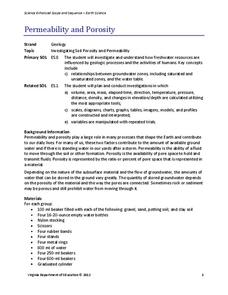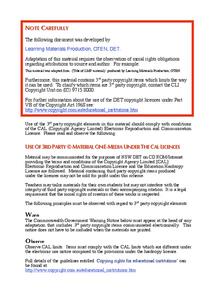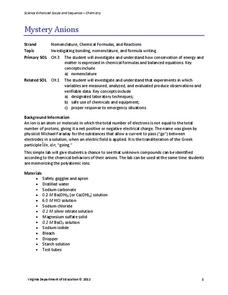It's About Time
Sounds in Strings
How many of your pupils play an instrument? A musical science lesson will help all of them understand how string instruments work. Young scientists construct a string-and-pulley system to test frequency and pitch. The lesson ends with a...
It's About Time
Making Waves
Young scientists use Slinkys to better understand waves. After creating and measuring many aspects of waves, they complete a handout and homework questions. The resource also introduces the final project for the chapter, though it does...
Virginia Department of Education
Permeability and Porosity
Covering both permeability and porosity, scholars perform a hands-on experiment testing various soil types. The material includes a pre-lesson worksheet to help focus pupils on the task at hand.
NASA
Determining the Nature, Size, and Age of the Universe
Prompt scholars to discover the expansion of the universe themselves. Using photographs of other galaxies, they measure and then graph the size and distance of each. Finally, they draw conclusions and prove the universe is expanding.
Millennium Schools
Lifestyle Chemistry
My name is Bond, Hydrogen Bond. Written for distance scholars working on chemistry at the high school level, the lesson includes eight weeks worth of material divided into six parts: substances you use, mixing it up, your skin, what's...
Virginia Department of Education
Mystery Anions
Lost an electron? You should keep an ion them. Young chemists learn qualitative analysis in the second activity of an 11-part chemistry series. After observing reactions of simple salts, the teacher provides pupils with unknown samples...
It's About Time
Building a Motor/Generator Toy
Combine science and playtime with the final lesson in an innovative unit. Scholars apply everything they have learned in previous lessons to build their own motors/generators and use it in a toy of their own design.
It's About Time
Detect and Induce Currents
Young scientists recreate an 1820 experiment and build off of it to investigate how to detect and induce electrical currents. As a final activity, scholars answer questions in multiple formats.
It's About Time
Refraction of Light
Don't shine like a diamond, refract light like a diamond. Young scientists use an acrylic block and a laser light to observe refraction. Advanced scholars figure the sine of the angles of reflection and incidence as well as mastering...
It's About Time
Sounds from Vibrating Air
Take note, or notes, as the case may be. A scientific music lesson is the third in a set of eight covering waves and instruments. Scholars use straws, test tubes, and water to create various wind instruments. Then, they read and answer...
Virginia Department of Education
The Hydrologic Cycle
There is the same amount of water on earth now as there was when it was formed. The water from your faucet could contain molecules that dinosaurs drank! Young scientists build their own hydrologic cycle model and observe it for five...
NASA
Just How Far is That Star?
Pupils often wonder how we know the distance to various stars. Starting with a thought experiment and progressing to a physical experiment, they determine the brightness and distance to various stars. The evaluation requires critical...
Chymist
The Solubility of a Salt in Water at Various Temperatures
An educational activity allows young chemists to test the solubility of different types of salt at various temperatures. Groups create a graph using data from unsaturated, saturated, and supersaturated solutions.
Curated OER
Lesson Plan Outline for Rainbow Science
Young scientists study light reflection and refraction as they determine the critical angle, the rainbow angle, and color separation in rainbows. Teams record the data they collect in a shared spreadsheet and discuss results with the class.
It's About Time
The Fossil Record
What do you call a plated dinosaur when he is asleep? A stego-snorus! Through four hands-on activities, young paleontologists rotate through stattions to learn about preservation in rock, resin, ice, and conservation of animal tracks....
It's About Time
Natural Selection
Are you the predator or the prey? Student groups participate in an activity to demonstrate the process of natural selection in a contained environment. After scholars complete the activity and questions, they apply their knowledge to a...
It's About Time
Is It Heredity or the Environment?
Himalayan rabbits are black when raised at low temperatures and white when raised at high temperatures. Young biologists participate in an experiment using seeds to demonstrate the ways the environment can influence an inherited...
It's About Time
Oil and Gas Production
Would you consider a power failure a current event? This lesson uses multiple experiments, guided inquiry activities, and group discussions to cover the topics of oil and gas production. This is the seventh lesson in a series of eight.
It's About Time
Exploring Energy Resource Concepts
Please turn off the lights to conserve energy. Or not, after all energy is always conserved. This first lesson in an eight-part series includes three parts. Part A contains one hands-on activity and two inquiry-based experiments on heat...
Curated OER
Reflection and Refraction
What is a prism? A place for light waves that commit minor refractions! The thorough resource includes three hands-on investigations covering light reflection and refraction; mirrors, lenses, and images; and optical systems. Subject...
Steinhardt Apps
Kinetic Molecular Theory
Building off young chemists' knowledge of the states of matter, kinetic molecular theory is the focus of the unit. Eight days of lessons including multiple demonstrations, one lab experiment, directed instruction, and worksheets,...
Curated OER
Genome: The Secret of How Life Works
What do you have in common with a fruit fly? About 60 percent of your DNA. The resource, divided into two units, is intended for grades four to eight and another for high schoolers. Both units include eight lessons covering the genome as...
Curated OER
Refraction B2—When is Light Reflected Internally?
Physics is phun in this lesson. Young physicists use a lightbox to test how and where light is refracted and reflected as it travels through transparent materials. Angles of incidence and refraction, sine of both angles, and the ratio...
Consumers Energy
Circuits and the Flow of Electricity Lesson Plan
I think I lost an electron. Are you sure? Yes, I'm positive! Starting with a hands-on demonstration and problem solving activity, young scientists define vocabulary related to circuitry and currents. Then they build their own circuits...

























